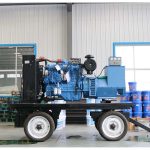Introduction
In remote areas where access to the main power grid is limited or nonexistent, diesel generators play a crucial role in providing reliable and continuous power supply. These generators are essential for various applications, including powering remote communities, construction sites, mining operations, agricultural activities, telecommunications infrastructure, and emergency response efforts. 400kw diesel generator will delve into the world of diesel generators for remote power supply, exploring their working principles, benefits, applications, maintenance requirements, environmental impact, and future prospects.
Working Principle of Diesel Generators
Diesel generators operate on the principle of converting diesel fuel into mechanical energy through combustion. The basic components of a diesel generator include an engine, alternator, fuel system, cooling system, exhaust system, and control panel. When diesel fuel is injected into the combustion chamber of the engine, it mixes with compressed air and ignites, generating high-temperature and high-pressure gases. These gases expand rapidly, driving the pistons within the engine to create rotational motion that powers the alternator. The alternator then converts this mechanical energy into electrical energy, which is transmitted to the connected load.
Benefits of Diesel Generators for Remote Power Supply
Diesel generators offer numerous advantages that make them ideal for remote power supply applications:
1. Reliability: Diesel generators are known for their robust and durable design, making them highly reliable in remote and harsh environments where other power sources may not be feasible.
2. Fuel Efficiency: Diesel engines are more fuel-efficient compared to gasoline engines, providing better power output for the amount of fuel consumed.
3. Power Output: Diesel generators can deliver high power output, making them suitable for powering heavy-duty equipment and machinery in remote locations.
4. Longevity: With proper maintenance, diesel generators have a longer lifespan than other types of generators, ensuring continuous power supply for extended periods.
5. Easy Maintenance: Diesel generators are relatively easy to maintain, with routine checks and servicing helping to ensure optimal performance and reliability.
Applications of Diesel Generators in Remote Areas
Diesel generators find widespread use in various remote power supply applications, including:
1. Remote Communities: Diesel generators are often used to provide electricity to remote villages and settlements that are not connected to the main power grid.
2. Construction Sites: Construction projects in isolated areas rely on diesel generators to power tools, equipment, and temporary facilities.
3. Mining Operations: Mining sites located in remote regions depend on diesel generators to run heavy machinery, lighting systems, and ventilation systems.
4. Agriculture: Farms and agricultural facilities in remote areas use diesel generators for irrigation, crop processing, and storage operations.
5. Telecommunications Infrastructure: Remote cell towers, communication relay stations, and satellite facilities require backup power from diesel generators to ensure uninterrupted service.
Maintenance Requirements for Diesel Generators
Proper maintenance is essential to ensure the reliable performance of diesel generators in remote power supply scenarios. Key maintenance tasks include:
1. Regular Inspections: Conduct routine visual inspections of the generator, checking for leaks, worn components, and signs of damage.
2. Oil and Filter Changes: Regularly change the engine oil and filters to maintain optimal lubrication and prevent contaminants from damaging the engine.
3. Fuel Quality: Use clean and high-quality diesel fuel to prevent fuel system issues and ensure efficient combustion.
4. Cooling System Maintenance: Keep the cooling system clean and well-maintained to prevent overheating and engine damage.
5. Battery Checks: Test and replace the generator's batteries as needed to ensure reliable startup and operation.
Environmental Impact of Diesel Generators
While diesel generators offer numerous benefits for remote power supply, they also have environmental implications that need to be considered. Diesel engines produce exhaust emissions containing pollutants such as nitrogen oxides (NOx), particulate matter (PM), carbon monoxide (CO), and hydrocarbons. These emissions can contribute to air pollution and have adverse effects on human health and the environment. To mitigate the environmental impact of diesel generators, advancements in engine technology, emissions control systems, and the use of cleaner fuels such as biodiesel are being pursued.
Future Prospects of Diesel Generators for Remote Power Supply
Despite the growing interest in renewable energy sources such as solar, wind, and hydropower, diesel generators will continue to play a vital role in remote power supply for the foreseeable future. The reliability, versatility, and high power output of diesel generators make them indispensable for applications where grid connectivity is limited or unreliable. Furthermore, ongoing advancements in engine efficiency, emissions control, and remote monitoring capabilities are enhancing the performance and sustainability of diesel generators in remote areas.
Conclusion
Diesel generators are indispensable for providing reliable and continuous power supply in remote areas where access to the main grid is limited. Their robust design, high power output, and ease of maintenance make them ideal for a wide range of applications, from powering remote communities to supporting critical infrastructure projects. While diesel generators have environmental implications, ongoing advancements in technology and fuel options are helping to mitigate their impact. As we look to the future, diesel generators will continue to be a key component of remote power supply solutions, ensuring that essential services and operations can function effectively in even the most isolated locations.

